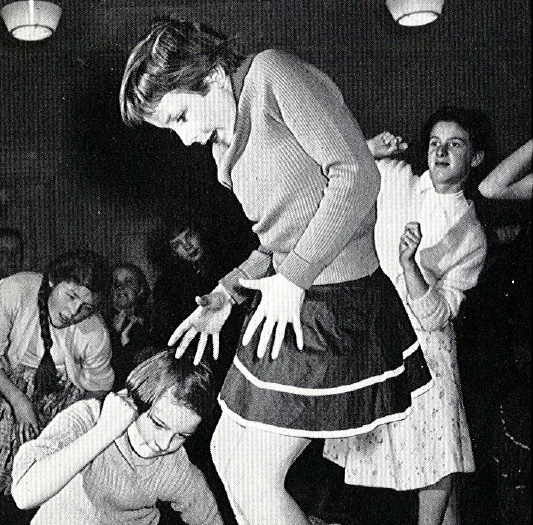SUSAN ELKIN visited Rose Bruford College to view first-hand the excellent classes offered to young people.
Rose Bruford College is an unusual drama school. Operating without a city centre presence, it is tucked away in a quietly rural and very beautiful corner of Sidcup in the grounds of the old house (complete with lake!) which forms its core. In fact, the ambience belies the reality. It’s only a short walk to Sidcup station and fast trains into London from this outer London borough. And there are lots of good modern buildings in the grounds. So the students who come here from all over the world to study acting, actor musicianship and a wide range of other theatre making skills get the best of both worlds.
As do the ones, aged four to eighteen, who come on Saturdays for Bruford Youth Theatre (BYT). “There have been Saturday classes here for a long time” Rose Bruford Head of Marketing, Alec Brand, tells me. “But it was just an external letting and it wasn’t especially strong. “So now Rose Bruford employs secondary school head of drama, Laura Gooden to run it as a college adjunct.”
Alex and I are sitting drinking tea in the sunshine outside the on-site café as groups of children troop past us en route to their classes. One waves cheerily. “That’s my daughter, Jessica, who’s 10” says Alec, telling me that all three of his children are signed up to BYT. “She used to be very shy but doing this has given her heaps of confidence. It shows in her school work and she read aloud in church last week.”
As with all good youth theatre, the training here is about much more than performance. Character development, self-assurance and communication skills are paramount. I watch a group of 9 to 12 year olds, for example, who are watching each other’s small group sketches inspired by characters in Alice in Wonderland and Through the Looking Glass and then making constructive comments. They are serious, respectful, perceptive and articulate.
Laura Gooden, wearing a BYT tee-shirt with “Laura” on the back (most of the students wear similar ones bearing their own names) is leading this session herself with incisive skill. It’s a very inclusive class. I’m pleased to notice the diversity too – children from various ethnic backgrounds and lots of boys. Some have special educational needs and there is a bit of bursary support available for families for which the £5 per session fee is a barrier. Alec gives me a list of the local areas they come from. Most of south London and north Kent is represented.
Each term there’s a theme. This term it’s Alice. Last term it was fairy/fantasy tales such as The Lion, the Witch and the Wardrobe.
Elsewhere in the building, other classes are being taught by other teachers. BYT covers a wide age range. There are over 120 students on role at present with waiting lists for some age groups. “That has built up from just 24 in 2012” says Alec. The Easter workshop, which is also part of BYT, has done well too. It had 37 participants this year but only 20 in 2015. The summer school for 8-16 year olds is popular too. This year it runs from 24-28 July. Of course, some of the participants will be regular BYT members, but the course is open to anyone.
Each BYT class is assisted by Rose Bruford full-time students. Five are employed – they must apply, and be interviewed in the normal way – and do this as a paid Saturday job. The College then organises disclosure and barring clearance for them so that they can work with children. “I just love applying my learning” says Poppy Fardell, who comes from Exmouth and is just coming to the end of her second year on the three-year BA in acting. “Everything is transferable and like most actors I shall almost certainly do some teaching in the future, so this is good experience as well as being fun. I’m learning a lot from observing the tutors too”. Some students use such observations and learning as the basis of the research project each has to write, which is another benefit.
Laura Gooden enthuses about the benefits for participating children too. “They form friendships here with young people from different schools who share their interests and that’s good to watch” she says telling me that the focus is entirely on drama. Singing and dancing are incidentals rather than taught as separate disciplines. “We work up to a performance each term for family and friends to showcase what we’ve been doing, although that’s not the main thrust of the work, and there is usually no charge for the ‘audience’ to attend. We just want them to come along and share their children’s achievements.”
Sometimes a participant works his or way through to the next stage of training at Rose Bruford. Both Alec and Laura mention Bradley Crittenden, a former BYT member, who is now on the full-time lighting course.
It’s really rather heart warming to see a drama school working so effectively week after week with young people years before they have to make career decisions, especially at a time when some – but not, of course, all – mainstream schools are marginalising arts teaching in general and drama in particular. And BYT is much cheaper to access than classes offered by the big franchises. “There is also a large, secure leafy car park” says Laura, “And that makes it for some parents!”



